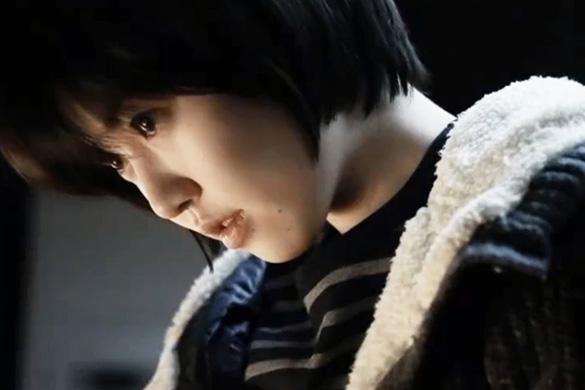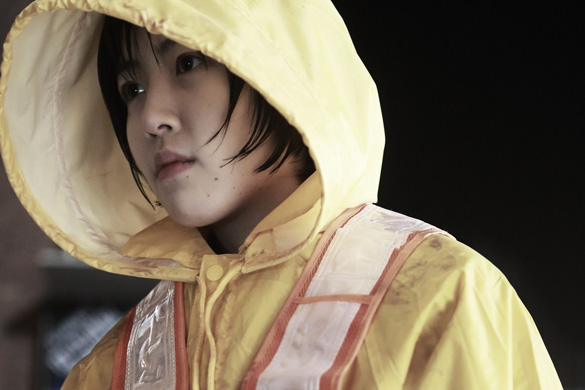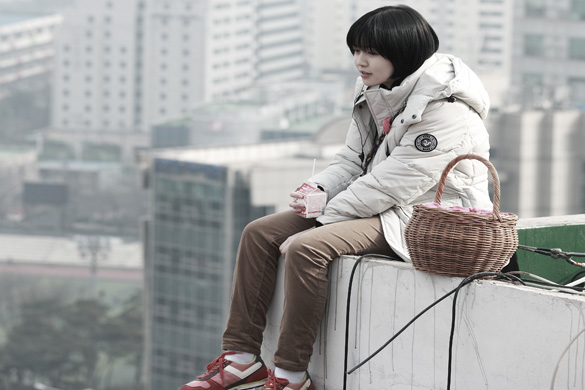"You made me the person I've become..."
Synopsis:
Fifteen years ago, serial killer Kim Ki-bum (Kim Sung-oh) was tried for seven murders including that of Police Chief Nam (Jeong Chun-hoon). However, a lack of evidence on six of the murders meant he was convicted only of killing his girlfriend, who had allegedly cheated on him, and was sentenced to a far shorter jail term than wished for by the victims’ relatives, detective Dae-young (Yoon Je-moon) - who was on duty on the night of Chief Nam’s death - and Chief Nam’s young daughter Hee-joo.
Present day, and Ki-bum is set to be released from prison, a day Dae-young has been actively awaiting determined as he is not to let Ki-bum out of his sight until he can gather enough evidence to see him incarcerated for life. Now grown into a young woman, Hee-joo (Shim Eun-kyung) has been waiting too, but for an entirely different reason...
Review:
Those Korean cinema fans reading the above synopsis, or indeed watching one of the trailers for ‘Missing You’, will likely feel they’re experiencing déjà vu to a degree and will probably have a veritable cornucopia of Korean films detailing female revenge in the wake of male violence and/or life destroying tragedy going through their minds.
Revenge has long been a major staple of Korean film narratives, having not only been noticeably prevalent for almost as long as references to violence itself but also through the years having served as both its cause and effect. Within the plethora of male-centric 'mano a mano' tales of violent retribution - from 'Oldboy' to 'The Chaser' to 'I Saw the Devil', and virtually all points in between - detailing revenge as a payment in kind, of sorts, for male brutality, abuse, torture and/or murder of (as often as not, helpless and largely innocent female) characters, there have also of course been regular examples too of women exacting feminine vengeance against specific males, in context, and by extrapolation against the male species as a whole.
However, though the repeated appearance of these stories of female retribution over the years without question speaks of the gradual shift in place of women in Korean society and the slow, often difficult move towards balance of the sexes as opposed to traditional patriarchy (and by the same token each slightly different case serving to underline the gradual change in depictions of female characters in Korean cinema narratives, in the process), it can hardly be denied that contrary to the majority of stories of male-oriented retribution female characters taking revenge largely undertake their vicious quests only after having lost semblance of rationale (again as often as not as a result of male actions) allowing them to ignore any question of moral right to concentrate on whatever action they feel is warranted to exact justice for the wrong they and/or their loved ones suffered.
Of course, this isn't always the case (take 'Sympathy for Lady Vengeance' as a contrasting example of a woman who clicks instantly back into normality once her vengeance is successfully concluded) but thrillers such as 'The Housemaid' (1960); 'Diary of June'; 'Princess Aurora'; 'Bedevilled'; 'Azooma' (and the list goes on) or even the endless horror stories of vengeful female ghosts (too many to mention) stand as pointers to the myriad of cinematic instances in which terrible events female characters are subjected to cause an implied yet unmistakable mental trauma leading directly to their utter fanatical obsession with bloody retribution at any and all cost.
 |
‘Missing You’ begins at the conclusion of Ki-bum’s trial, his sentencing watched by his victims’ families, Dae-young and Hee-joo as a young child. Melancholy music replaces all other sounds immediately after the sentence is handed down as visuals show the court audience erupting in wailing, screaming disbelief at the brevity of the stated jail term, the camera then moving to focus on Hee-joo (and her patent pink shoes) as she ever so slowly takes a step backwards, then another and another. To my mind, this points as much to Hee-joo retreating into herself as it does to her physically wanting to step away, especially when combined with the fact that in every scene in which we see her as a child after her father’s death she stares blankly ahead saying not a word.
By the time we meet Hee-joo as an adult working as a police scout/mascot, she has cultivated two personas - appearing as a sweet, sunny and happy young woman to those she cares about while to those she feels are doing wrong she is a constant malevolent presence.
However, though Hee-joo clearly is broken (Post-It notes with Nietzsche quotes cover her entire apartment walls and news clippings relating to the murders are glued onto the floor like tiling) and while she fully admits that Ki-bum made her the way she now is, she nonetheless retains a moral compass firmly believing that some of her vengeful actions and plans must ultimately be punished just as surely as she intends to punish Ki-bum, as well as willingly resigning herself to the need to become a monster to catch a monster.
Of course, these ideas too have appeared in numerous Korean films – not least some of those mentioned above – but director Mo Hong-jin does make efforts to try to ensure ‘Missing You’ is more than simply a one-trick revenge ‘pony’, if you will, though those very efforts also raise the question of originality on more than one occasion.
 |
‘Missing You’ focuses on three main genre ideas: Hee-joo’s revenge story; Ki-bum’s serial killer tale; and Dae-young’s procedural police drama. Of these, the procedural investigation is by far the weakest simply because the police are consistently portrayed as inept to almost the point of utter stupidity, and annoyingly so. I hardly need to say that less than bright police (again) have featured in numerous Korean films over the years but classic examples that actually worked did so because police ineptitude had a legitimate reason and context attached to it. Here the vast majority of police officers are just plain dumb to the extent that I actually began to question how they’d ever caught Ki-bum in the first place.
Mo Hong-jin does also have a tendency, especially in the early stages of the film, to push the melodrama a little further than necessary. Suddenly, mournful music will begin, the camera will focus on young Hee-joo and we are expected to spontaneously emote. Don’t get me wrong, the scenes in question are fairly moving on their own but it’s blatantly obvious that they are coming and as such their effectiveness is undermined rather than being accentuated. On the plus side, the horror scenes themselves are consistently well depicted, brutal but never overstated, and more often than not they wholly succeed in being twisted enough to be memorable.
However, the real strength of ‘Missing You’ lies in the progression of Hee-joo’s story and indeed its ultimate conclusion. Sure, you’ll likely have seen a similar culmination of a character arc before, but certainly as far as I’m concerned it still appears as a surprise.
While it could be said that 'Missing You' speaks, to a degree, of a justice system handing out too lean sentences to criminals and of the fallout that trend causes to victims, no real commentary is made on the issue. As such, 'Missing You' stands as simply a revenge thriller set over an extended time period to the present day - no more, no less - rather than being a particular or insightful critique of aspects of Korean society. That said, as a revenge story 'Missing You' serves its purpose well enough.
As a final note, ‘Missing You’ is solely the English language title chosen for the film, the original Korean title translating as ‘Waiting for You’. In spite of Hee-joo being shown on a couple of occasions lovingly cleaning her father’s police commendation award hanging on the wall (and obviously missing him deeply, in the process), considering the overall narrative the Korean title to me fits far, far better.
Summary:
While many of the narrative elements of ‘Missing You’ will be very familiar to fans of Korean cinema, its story of one young woman’s need for revenge is engaging enough to make the film worth watching, its strongest point being its ultimate conclusion.
'Missing You' (널 기다리며) / 2016 / directed by Mo Hong-jin
|




